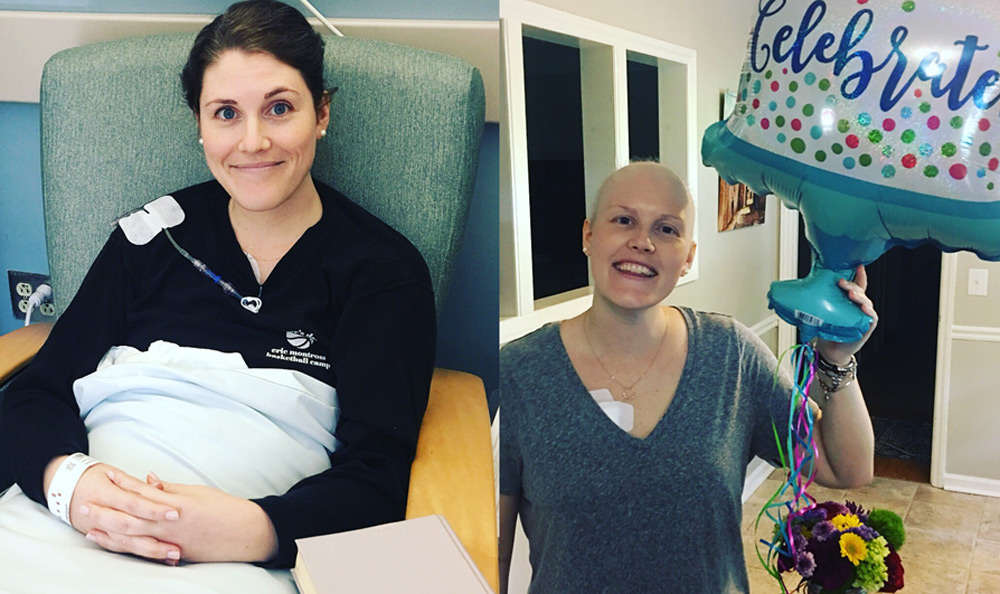
The “C word” is scary, and not just for the person diagnosed with cancer. It can feel like a shock for family and friends too. Most of the time, people want to help, but they don’t always know what to do or say.
As someone who has lived through the complicated path that a cancer diagnosis brings, I often get asked what you can do for someone who has been recently diagnosed or is going through treatments. While everyone’s experience with cancer is different, I hope you can turn to this advice to support a loved one who has been diagnosed.
It sounds simple, but I think the best thing you can do to support a loved one is to be there for them. Be a listening ear. Be the person that checks in regularly. Be the one who remembers their treatment dates, scans, or doctor’s visits. A simple phone call or text message to let someone know you are thinking of them and that you care can mean so much.
But try to keep your expectations of a response at bay. When you are first diagnosed with cancer, it’s overwhelming. Not just because of the diagnosis, but because everyone around you is reaching out to you. Your high school best friend that you haven’t talked to in 10 years, your aunts and uncles, your college roommate. They all want to let you know they heard the news and are there for you. But it is a lot to digest a cancer diagnosis, and repeatedly talking to others about it can cause a lot of anxiety.
For me it became too much, and I shut down. I stopped answering my phone and responding to people who would reach out. It was easier to shut out the world and just focus on myself.
Know that your loved one has a lot on their plate and may not have the energy to talk on the phone or answer a text. Don’t take it personally if you don’t hear back. And don’t let that keep you from reaching out and letting them know you care.
Two days after I was diagnosed, I had 10 flower deliveries in one day. I was overwhelmed by the generosity of my friends and family. Flowers, coloring books, blankets, baked goods. The list went on and on. Things to keep me busy during chemo, hats for when I lost my hair, and vitamins or supplement to help me stay strong.
While all of these gifts were incredibly nice, what was really great was when someone brought me a gift they knew I loved. My favorite coffee from the local shop, the chicken noodle soup I always devour, or the lotion I wear every single day.
Gifts are absolutely unnecessary, but if you want to purchase something, try to buy them something they’ve specifically asked for or that will make their life a little easier. Can you pick up dinner or a gift card from their favorite restaurant? Instead of buying them something you think they will need, try to think of something they already love. It will lift their spirits, and you know it won’t go to waste.

“Please let me know if there is anything I can do to help!” It’s a phrase I have used so many times when trying to be supportive to my friends. But it can place the burden on your loved one to ask for help – something that isn’t always easy. Maybe it’s just me, but I wouldn’t feel comfortable reaching out to a friend and asking them to bring me dinner on Tuesday night.
Instead, be specific with what you would like to do. For example:
- “I’d like to bring you dinner on Tuesday night. Will you be home?”
- “Can I pick up some groceries for you?”
- “Do you need a ride to any appointments this week? I’d love to take you.”
I found one of the hardest parts of cancer was all the daily tasks of life that must get done. Groceries, cooking dinner, doing laundry, getting your oil changed, cleaning the house. These things still need get done and when you’re fatigued from treatment, it can be incredibly helpful to have someone else take it off your plate.
My mother-in-law asked if she could get me a cleaning service while I was going through radiation and chemotherapy. I never would have asked for that or asked her to come clean my house, but it was the biggest help I could have imagined and took a lot of stress off my shoulders.
A lot of people reach out when you are first diagnosed with cancer, but slowly they start to disappear. Because you don’t have the energy to go out for dinner or drinks anymore, the invites stop coming. Because you don’t feel like giving updates on your treatment, the calls slow down.
Remember to be there beyond the diagnosis. Cancer can be a long battle with treatments lasting many years. It can help to check in continually throughout the year or years that they go through treatment. Just sending a simple text – “Thinking of you and hoping you are feeling strong today”– can lift their spirits.
These reminders are something I take to heart now when my friends are going through hard times. I want to make sure they feel supported by me and know I care. I found it is helpful to set up calendar reminder for important days, like a big doctor’s visit or the anniversary of finishing chemotherapy. It helps me remember to check in and send them a note of encouragement. I know from firsthand experience how meaningful it is when someone remembers to check in on those difficult days.
I also think it’s so important to remember every person is different, which means everyone’s cancer diagnosis will also be different. Try not to compare experiences or offer blanketed advice about their medical condition. Focus on supporting your loved ones with a listening ear and trying to take some of life’s daily burdens off their plate.
The American Cancer Society has great resources for caregivers and family to help you learn what to expect if you become a caregiver for a person with cancer, and get tips for making sure that you take care of yourself as well.
Blue Cross and Blue Shield of North Carolina does not discriminate on the basis of race, color, national origin, sex, age or disability in its health programs and activities. Learn more about our non-discrimination policy and no-cost services available to you.
Information in other languages: Español 中文 Tiếng Việt 한국어 Français العَرَبِيَّة Hmoob ру́сский Tagalog ગુજરાતી ភាសាខ្មែរ Deutsch हिन्दी ລາວ 日本語
© 2026 Blue Cross and Blue Shield of North Carolina. ®, SM Marks of the Blue Cross and Blue Shield Association, an association of independent Blue Cross and Blue Shield plans. All other marks and names are property of their respective owners. Blue Cross and Blue Shield of North Carolina is an independent licensee of the Blue Cross and Blue Shield Association.


